59CD - Archer / Mwamba / Bennett / Fairclough - Sunshine! Quartet - CD plus download
TweetListen
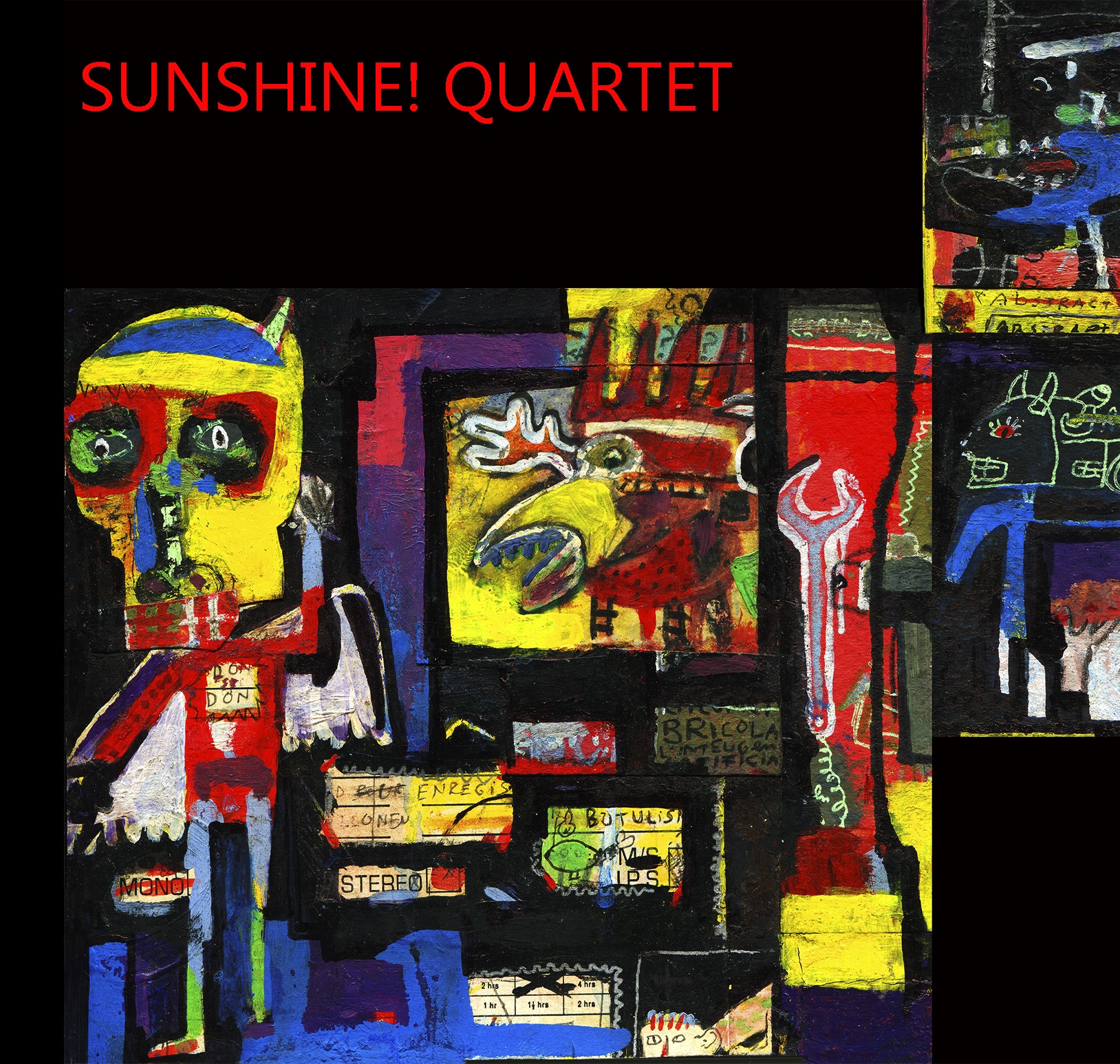
Martin Archer - alto and sopranino saxophones
Corey Mwamba - vibraphone
Seth Bennett - double bass
Peter Fairclough - drums
First release in a new series of small groups drawn from members of the Discus Music family. The concept is for the group to meet, write, rehearse and record in one single session - old school style!
Sunshine! Quartet features four Discus regulars each bringing a composition to the table which together make for a spontaneous and exciting slice of pure jazz skill.
Also our first collaboration with the fabulous Chilean artist Gonzalo Fuentes / Guerrilla Graphics.
Always beautiful and punchy, tightly meshed and loose - alive and very direct! – Achim Breiling, BABYBLAUE SEITEN
____________________
Peter Fairclough’s title for the opening track, Four Free To One, has its roots way back in the old world’s wording of true groundbreaking innovative UK indie labels like Ogun Records. ‘One too free for’ could count in a crossover of rhymes which have little alignment to beats or bar lines yet still swing the mother and the father. It raised a smile on my face. And Sunshine! Quartet is exactly what you want to hear when the going gets tough. A ray of sunlight in darkness as a class act comes forth and pirouettes across the ears.
There are four tracks, credited to each of the players involved. It was recorded in the same studio just over a week before Martin Archer’s other sizzling quartet recording reviewed this month, Felicity’s Ultimatum. If you think Sunshine! Quartet is going to be similar ground, it isn’t. Yes, there are four of them, a different four other than Mr Archer, and yes, it is another mesmerising performance, and yes, the sleeve graphics come from the same source, however Sunshine! Quartet declares a ‘jazz’ consciousness, one which the Felicity line-up eschews.
Both approaches are valid and I’d be hard pressed to give a preference. I did not refer to the J word in Felicity’s review. To not use it in any discussion of Sunshine! Quartet would be to miss an important element. On Four Free To One Martin Archer’s alto horn produces a carnage as close to Jackie McLean’s dissection of a jazz standard as it's possible for an Englishman to get. It’s that sound of an internal vibration in the horn; fabulously unsettling and comfortingly compelling at the same time. Peter Fairclough’s drums really rattle around him. Precise, but twice as hectic in the way that ‘jazz’ contains the inherent spirit of crash and burn.
On It’s Not Finished (a long decisive workout, nearly twenty minutes in duration), Seth Bennett centres his double bass, to wrap his fingers around the scales as if Charles Mingus himself had returned to the living. And finally, the great Corey Mwamba, whose vibraphone has designed space for people like Nat Birchall, Orphy Robinson and Robert Mitchell, now explores the J-word ticket in a duet with Seth Bennett recalling the empathy of bass/vibes masters like Richard Davis and Bobby Hutcherson. To get this close, and then do your own thing is a stroke, not of luck, but something far more meaningful.
Seth Bennett’s composing credit on this session is Alsten (I think the name is probably a reference to an island connected to the Norwegian coast by the elegant Helgeland Bridge). The fact is, Alsten the composition, crystallises the essence of a place or person. For my money it’s a track worth anyone’s investigation. It carries its creativity with slow, formidable grandeur. The sort of recording that ECM’s Manfred Eicher excels in, except that Martin Archer’s production, along with David Watts' engineering, is less ‘formal’. The Archer’s Quartet do not engage in ‘take’ after ‘take’ to arrive at this sound. Listen through this twelve minute ballad track and there is a natural warmth that comes through by not being overworked. The beauty is in it simply being played. Initially Seth Bennett holds a bowed drone, Mr Fairclough uses mainly beaters throughout, the saxophone reed is lip suction tight to the melody opening up a well of measured vibraphone cross hatching across Bennett’s ‘woody’ double bass as he reverts to plucked notes for the duet. Even when Mr Archer’s alto falls into his own articulate solo, Corey Mwamba surrounds him with measurement in the backdrop. They never give Alsten away. They play the intention.
On this their closing number, Sunshine! Quartet have produced an outstanding performance that holds its own integrity together.The driver for me when I come to a Martin Archer recording is only partly about the question: ‘do I like it’? I do; because I admire someone who is constantly seeking a new context for the next idea. I like it because whatever ‘it’ actually is, Sunshine! Quartet is not the same animal as Felicity’s Ultimatum or for that matter Story Tellers, which we reviewed in November 2016, or Engine Room Favourites or Martin Archer’s ongoing collaborative work with Julie Tippetts. Each of these projects is unique. And for me the real driver is not simply that they are different from each other, but this changing process is not done purely for the sake of it. Mr Archer constantly re-evaluates the material, the muse, and designs accordingly. He is not hemmed in by his own past.
In the scheme of things Sunshine! Quartet should give him a bigger profile. It’s a quartet with a reasonably orthodox line-up. There are four ‘composed’ works worried and woven through with extremely sophisticated improv. These are all guys who carry a certain amount of ‘reputation’; the playing is of a mountain high standard. Each of these tracks carries its own individual construct. Yet it seems to me that Martin Archer is another example in the UK (other names like Paul Dunmall, Steve Beresford, Maggie Nicols, Loz Speyer, Pat Thomas come spinning off the top of my head) whereby brilliant ‘street-up’ musicians who have constantly forged truly mindbending original work over long, long periods are overlooked. Last night I was at a gig (in the south of England) and I mentioned Mr Archer’s name to a ‘status’ musician, who said he had “never come across him.” Whaaaat! Okay, it’s a rant.This is an album you could seriously get involved in. It’s not ‘difficult’, this is UK ‘jazz’ at its creative best, it carries its own certification of class. Martin Archer produced it. Get down onto his website and order a copy. Keep the keeper alive. - STEVE DAY, SANDY BROWN JAZZ
____________________
This return to real time improvisation presents an intriguing prospect, and Archer doesn't disappoint. The ply off of tart, staccato saxophone against the ever-alert harmonic slipstream of Corey Mwamba's vibraphone inevitably involkes distant memories of Out To Lunch, as does the underlying structural tension between freedom and groove. Each member of the quartet contributes a composition and throughout the musicians don't just play the structures, but actively transform their composed beginnings through the process of improvisation. Mwamba's knack of reaching inside and gently spinning the material in a wholly unexpected direction is beguiling. - PHILIP CLARK, JAZZWISE
____________________
Balances melodic jazz and formidable free improvisation. – SQUIDCO
____________________
You never know what path British reedman, multi-instrumentalist Martin Archer will traverse. Whether he's leading orchestral units, freely improvised trios, avant-rock and electronics tinged fare or his recordings with legendary rock and jazz vocalist Julie Tippetts, the artist underscores his experimental implementations with the element of surprise. On this quartet date with his fellow countrymen, Archer occasionally interweaves an abstract Birth of the Cool type vibe with forceful mini- motifs, sublime melodies and hearty improvisational sectors. Moreover, each musician contributes one composition amid this democratically fabricated engagement that is built with structural components and a horde of contrasting powerplays featuring themes that implicate a beauty and the beast framed overture. Here, the quartet's feisty inner-workings combine warmth and jubilance with a few maddening breakouts.
Archer's "It's Not Finished" is the lengthiest piece, clocking in at nearly 20-minutes. And it's a hybrid scenario as Archer dishes out hardcore sax lines, complemented by vibraphonist Corey Mwamba's delicately textured notes along with the frontline's deft unison choruses and fluid cadences. They also cycle through a simple, yet somewhat mesmeric ostinato motif where Seth Bennett lays down a busy but productive foundation and ingrains his voice into the heart of matters. There are muscular movements, plaintive squeals and bluesy outbursts.
The tide turns on the funky "What on Earth Could You Mean?," as the saxophonist and vibraphonist pump it up, along with some musical rough-housing. Archer's aggressive alto sax solo parallels an argumentative human voice. Nonetheless, the program covers a lot of ground, complemented by disparate angles and bundles of persuasive contrasts. It's yet another strong entry in Archer's wide-raging discography that comprises a horde of enterprising formats and cross-pollinated instances of the progressive jazz vernacular. – GLENN ASTARITA, ALL ABOUT JAZZ
____________________
On ‘Sunshine! Quartet, there are four pieces and each is credited to one of the members of the quartet. The credits are not obviously related to the particular role that an instrument had in producing the piece. Indeed, I wondered if there was some mischief in having the opening track, ‘For free to one’, credited to a drummer whose main role seemed to be to provide a grumbling backdrop to the other players. As this piece opened, Archer introduced a couple of themes on saxophone and then the other players worked in their own directions, with the bass playing some running lines and the vibes providing chords in support. The drums kick off on the second track, ‘It’s not finnished’ (pun intended), and Archer and Mwamba trade licks mid-way through before pulling apart into two contrasting melodic lines. The piece closes with Archer playing something approaching a mournful blues, with Bennett’s arco bass emphasising the lament. Throughout this, and the rest of the set, the pieces create a logic in their perversity – players working against the grain laid down by their colleagues, but doing so in a way that feels collaborative and conversational, rather than argumentative or antagonistic. In a sense, you feel that as soon as the players find a definite frame of playing, one of them will make sure that there is a shift to keep them from being too settled. – Chris Baber, Jazz Views
____________________
Grande è l’energia generata e trasmessa dal quartetto composto da Martin Archer (sassofoni), Corey Mwamba (vibrafono), Seth Bennet(contrabbasso) e Peter Fariclough (batteria) in questo album che combina improvvisazione free, improvvisazione melodica e robusti sprazzi di groove funky. In ognuna delle quattro tracce (composte una a testa dai quattro musicisti) l’interplay diviene arte della performance musicale. Unico elemento critico è che il disco non spicca per grandi novità, almeno quelle novità cui ci abitua la ricerca artistica di Martin Archer, e forse è proprio questa la novità. Ciò non toglie che riprendere la forma del quartetto e farlo con questa classe cristallina è pur sempre una gran bella cosa. L’arciere non manca mai il bersaglio. - Alessandro Bertinetto, Kathodik (****)
Great is the power generated and transmitted by the Quartet composed by Martin Archer (saxophones), Corey Mwamba (vibraphone), Seth Bennett (bass) and Peter Fariclough (drums) in this album that combines free improvisation, improvising melodic and strong splashes of funky groove. In each of the four tracks (composed one each from the four musicians) the interplay becomes the art of musical performance. One critical element is the disc stands for big news, at least those innovations which we used artistic research by Martin Archer, and perhaps this is the news. Nevertheless, resume the shape of the Quartet and do so with this crystal class is still a good thing. The Archer never misses the target. – KATHODIK (Google translation)
____________________
It is astonishing that British saxist/composer/labelman, Martin Archer, now has 91 releases on the Discus label, many of which are double discs and the majority are either led by or collaborating with Mr. Archer as well. Aside from playing electric keyboards, electronics, composing & producing many of these discs, Mr. Archer is a mighty fine acoustic saxist on both alto and sopranino sax. The Sunshine! Quartet consists of Archer on saxes with Corey Mwamba, great young vibist of the moment, bassist Seth Bennett, who is on several recent Archer discs and the great drummer, Peter Fairclough, who has worked Keith Tippett, Paul Dunmall & Mike Westbrook. The quartet here is superbly balanced and recorded, warm, mostly acoustic. There are just four tracks here, each member of the quartet contributing one. Mr. Fairclough’s “Four Free to One” is first and features some a cosmic stream of notes from the sopranino and vibes, circulating around one another while the acoustic bass & drums provide an organic cushion below. Mr. Archer’s “It’s Not Finished”, takes off spinning furiously yet maintaining its cool. The band is tight and burnin’! First there is a long vibes solo and then an alto sax solo, both are incredible with an equally impressive rhythm team keeping the flow going. “Alsten” brings things back to Mother earth with a blisterin’ funky/village groove with some slammin’ Fela-like spice. Put on your dancing shoes and get on down! You know that you need the jubilant spirit even more right now so…. Get Down! - Bruce Lee Gallanter, DMG
____________________
Martin Archer proslul na Discus-Music svými rozsáhlými experimenty, dlouhodobě koncipovanými, vrstvenými, promixovanými a prosložiťovanými (viz nedávné Bad Tidings from Slackwater Drag, 2014, nebo Story Tellers, 2016). Když se nyní rozhodl přehodit výhybku a zahájit zbrusu novou, přímočařejší sérii Quartets jako kontrast k těmto projektům, neučinil to kách, ani nepomyslel na odbytý „vedlejšák“. Naopak: chce dokázat, že i bez technických fíglů může překvapit neobvyklými kombinacemi souhry. Hudebníci, které do svých kvartetů přizval, pocházejí až na výjimky právě z jeho širších společenství; tady mají možnost se plně prezentovat autorsky i hráčsky. Autorsky: v případě Sunshine! Quartet se podělili o skladby rovným dílem, při Felicity’s Ultimatum převládá Archer. Ačkoliv na druhé desce jsou pouze dvě čísla uvedena jako improvizace, připadá mi, že všechny nahrávky obsahují značný podíl svobodného vyjádření všech hudebníků. Sám Archer sáhl v prvním případě po altce a sopraninovém saxofonu, na druhé desce k nim přidal ještě baryton saxofon. Na Sunshine! jsou jeho partnery Corey Mwamba s vibrafonem. Seth Bennett s kontrabasem a bubeník Peter Fairclough; na Ultimatu se uplatnili houslista Graham Clark, pianista Stephen Grew (jediný homo novus) a Johnny Hunter s bicími. Obě alba vznikla v castlefordských Chai Works 14. a 23 října 2016 a práce na nich záměrně nepřesáhla dva dny, o jednotné výtvarné zpracování se postaral čilský umělec Gonzalo Fuentes.
Proměna nástrojů sama o sobě předurčuje vyznění, stejně tak důraz na jednolitost (čtyři skladby v prvním případě) nebo větší proměnlivost (10 vstupů na druhém), nikoli však námětovou změť (upřesním). Slunečný kvartet příjemně překvapí uceleným čtyřhlasem s vyváženě jemnou melodičností, vydramatizovanou vábivým sopraninem, postupkovou basou, klinkavým vibrafonem a čepýřivými bicími, ale to vše se mění od něhyplnosti k nutkavé překypnosti, od decentní zaujatosti po rázně prodernou, nicméně srostitou, vehemenci. Vše protýká do chvatu rytmika s výraznou basou a s vibrafonovými eskapádami a samozřejmě s vířivostně podhutňujícími bicími, ale za tohoto hromobitného vření smečuje a smyčkuje fascinující altka, roztajňující vypravěčské obzírání. Takřka samohybný proud bez zábran, plný zvratů (nikoli rozvratů, přesto v nich cítím „ať se práší za kočárem!“), vždy v pravý čas překypí, navrší se, a to je přesně příležitost tento střih využít a poznovu odkrývat už dobyté pozice (i uprostřed skladby) až do vrcholícího vzmachu. Archerovy saxy jsou to, které (za obehřímající účasti zarputilých bicích) jsou inspirátorem nenadálého dění. Mělní ruch v melodii, jemně pošírávají, zdůvěrňují, zniterňují děj, dostávají se až „pod kůži“. Nikdy však nejsou osamoceny, basa ten děj předvídá, zaceluje jeho neodhadnutelné momenty (někdy i s vibrafonem společně), důležitá však je souzvučnostní hierarchie, kdy jeden nástroj takřka samovolně reaguje na druhý, nenásilně, bezezbytkově. Je to spřežení každým coulem srostité, důvěrnostně odmatňované, se sjíždivou houfovaností. -KULTURNI
____________________





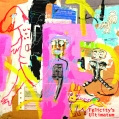 60CD - Archer / Clark / Grew / Hunter - Felicity's Ultimatum - CD plus download
60CD - Archer / Clark / Grew / Hunter - Felicity's Ultimatum - CD plus download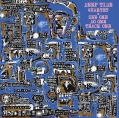 64CD - Deep Tide Quartet - See One, Do One, Teach One - CD plus download
64CD - Deep Tide Quartet - See One, Do One, Teach One - CD plus download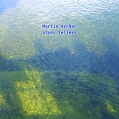 57CD - Martin Archer - Story Tellers - CD plus download
57CD - Martin Archer - Story Tellers - CD plus download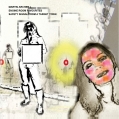 66CD - Martin Archer + Engine Room Favourites - Safety Signal From A Target Town - CD plus download
66CD - Martin Archer + Engine Room Favourites - Safety Signal From A Target Town - CD plus download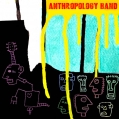 90CD - Martin Archer - Anthropology Band - CD plus download
90CD - Martin Archer - Anthropology Band - CD plus download